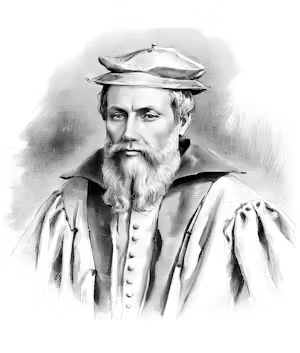Zacharius Ursinus
1534–1583
The Happy Professor
The opening of the Heidelberg Catechism (1563) makes one of the most ringing affirmations of faith in all of Christian history:
Q: What is your only comfort in life and death?
A: That I am not my own, but belong with body and soul, both in life and in death, to my faithful Savior Jesus Christ.
The Heidelberg Catechism was the product of a team of authors commissioned by the German elector Frederick III, a devout Protestant prince during the early decades of the German Reformation. Chief among the catechism’s authors was University of Heidelberg professor Zacharius Ursinus.
Humble Reformer
Ursinus was a student of Philip Melanchthon, who himself was one of the key disciples of the great German Reformer Martin Luther. Luther had died in 1546. As a young man in the 1550s, Ursinus journeyed through many of the major capitals of the European Reformation, meeting Geneva’s John Calvin, among other key Reformed leaders.
During this era, German Reformers were deeply divided over theological questions such as the exact nature of the Lord’s Supper. When the humble Ursinus was called to become a professor at Heidelberg in 1561, he declared, “Oh, that I could remain hidden in a corner!” But God was calling Ursinus to Heidelberg to help secure the legacy of the Reformation.
The Heidelberg Comforter
The Heidelberg Catechism was published anonymously, but most observers today credit Ursinus with taking a lead role in writing it. Its emphasis on Calvinist doctrine made it one of the most broadly influential catechisms of the Reformation era.
The Heidelberg Catechism was quickly translated into a number of other languages, including English, in 1572. It would be surpassed in notoriety in the English-speaking world only by the Westminster Confession of Faith, produced in England during the next century. One of the reasons the Heidelberg Catechism was so successful is that it used unifying language about disputed issues, such as those related to the Lord’s Supper. Ursinus did not wish to further exacerbate divisions among Protestants.
Befitting Ursinus’s Calvinist convictions, however, the catechism paints a grim picture of the state of humanity outside of Christ. In question and answer (Q&A) 5 of the catechism, Ursinus tells us (based on a host of supporting biblical references) that we are “inclined by nature” to hate God and our neighbor. Q&A 8 asks whether we are “so corrupt that we are totally unable to do any good.” Ursinus answers that yes, we are that corrupt “unless we are regenerated by the Spirit of God.”
Conversely, a life redeemed by God is one of holiness, contentedness, and unspeakable joy into eternity. The comfort contained in the first question comes from understanding the great depth of our sin, the great rescue Christ brings from the “misery” and wrath we face because of that sin, and the great thankfulness to God that the knowledge of our deliverance brings. Ursinus explains that our “new nature” in Christ is a “heartfelt joy in God through Christ, and a love and delight to live according to the will of God in good works.” Joy in our redemption, to Ursinus, is the foundation of holy living.
Legacy of Joy
In spite of Ursinus’s efforts to unify the feuding Protestant factions, Frederick III’s successor removed him and other Calvinist professors from the Heidelberg faculty in the 1570s. Ursinus found work at a Reformed academy not far from Heidelberg. He died in 1583 at age 48.
Through the Heidelberg Catechism, and through the extensive lectures he published defending the theology behind the catechism, Ursinus left a rich repository of biblical instruction for future generations of believers. Ursinus’s teachings still inspire much joy today, not least because of the great work God did through him and the whole host of Reformers.
For more on Zacharius Ursinus:
The Good News We Almost Forgot: Rediscovering the Gospel in a 16th Century Catechism by Kevin DeYoung
An Introduction to the Heidelberg Catechism by Lyle D. Bierma
Thomas S. Kidd (@ThomasSKidd) is research professor of church history at Midwestern Baptist Theological Seminary, and the author of books including Thomas Jefferson: A Biography of Spirit and Flesh (Yale University Press, 2022).


